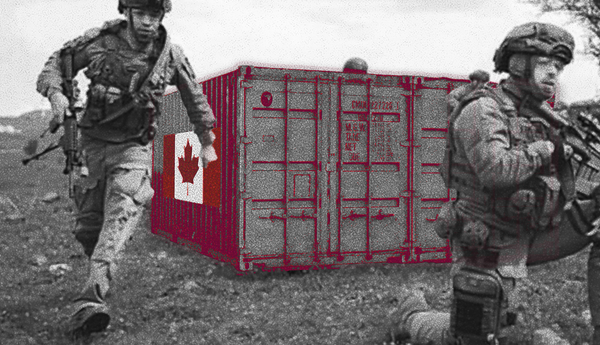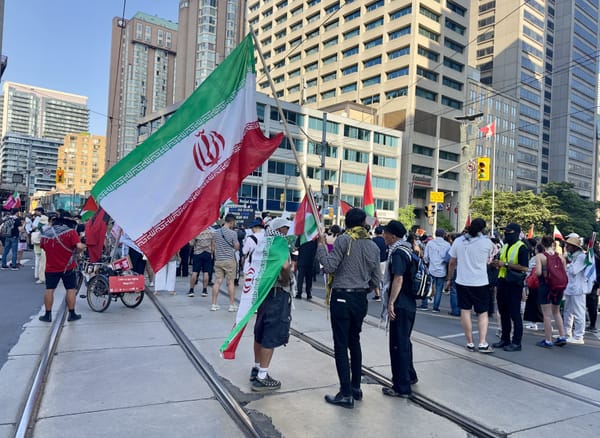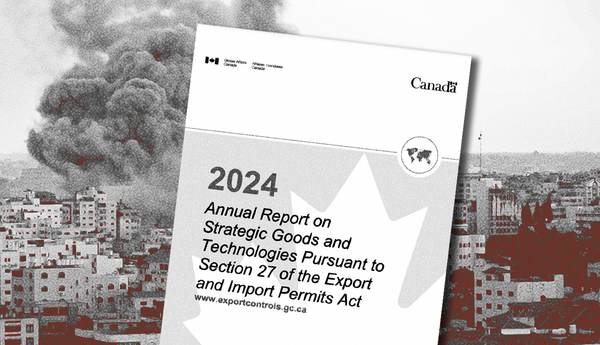In March, I spoke to Yurii Sheliazhenko, a peace activist based in Kyiv, which was under attack from Russian forces in the early stages of the brutal and illegal invasion of Ukraine. Sheliazhenko, who was regularly awoken at night by the sound of exploding shells, explained that although Russian President Vladimir Putin had no right to invade, Canada and other NATO countries had contributed to escalating the conflict by expanding the West’s military presence in Eastern Europe and flooding Ukraine with weapons. In doing so, Canada helped transform Ukraine into a battlefield in a NATO proxy war against Russia, while also refusing to push for a peace deal. “Ukraine is encouraged to fight for the last drop of blood,” Sheliazhenko explained.
In May, Ivan Katchanovski, a University of Ottawa professor with expertise on Ukraine, told me the war could have been prevented if the country agreed to remain neutral, and if the West had pushed it to fulfil the Minsk agreements to end fighting in the Donbas region. Katchanovski added that seeking a peace deal with Russia “was not a policy of the United States,” which has maintained strong influence over Ukraine since the Western-supported Maidan uprising in 2014 triggered the Donbas conflict.
According to a study published by the University of Calgary’s School of Public Policy earlier this month, the sort of views expressed by Sheliazhenko and Katchanovksi — a peace activist directly impacted by the war and a respected academic — constitute “disinformation” and “pro-Russian propaganda.”
The study, which was picked up with a widely-syndicated story by the Canadian Press (CP), contains analysis of 6.2 million Twitter posts collected since January intended to “measure Russian influence operations on social media.”
It lists five alleged “pro-Russian narratives” supposedly doing rounds on social media: “implying NATO expansionism legitimizes the Russian invasion; portraying NATO as an aggressive alliance using Ukraine as a proxy against Russia; promoting a general mistrust in institutions and elites; suggesting that Ukraine is a fascist state or has extensive fascist influences; promoting a specific mistrust of Canada’s Liberal government, and especially of Prime Minister Trudeau.”
The study also suggests that pointing out the West’s very public and material support for the 2014 overthrow of Ukraine’s elected government also amounts to Kremlin propaganda.
Despite labelling these perspectives as “disinformation,” which it defines as “false information intended to manipulate, cause damage, or guide groups and people in the wrong direction,” the study offers no factual rebuttals to any of them. The reader is presumably supposed to accept without question, for example, that NATO aggression doesn’t exist and is nothing more than a lie concocted by the Russian state, despite abundant evidence to the contrary.
Seemingly unable to find sufficient numbers of those who criticize NATO expansion also expressing support for Russia’s invasion, the study instead suggests that critics are “implying” that NATO’s behaviour “legitimizes the Russian invasion,” or that they “tended to characterize” the invasion as justified. Nevermind the fact that some of the most vocal NATO critics in Canada have published detailed and clear condemnations of Russia’s invasion.
The study’s lead author, Jean-Christophe Boucher, has received at least $2.4 million in research funding, including from the Department of National Defence, which isn’t mentioned in the CP article. I emailed Boucher on June 13 with a list of detailed questions about the study, as well as one about how much research funding he has received from DND.
The same day, he replied, saying: “I thought about it and talked to our comms team. I really appreciate your candidness and where you come from, but as you can probably already assume, I don’t know if there will be a fair treatment of any answers I could give. Rorty used to say that for any meaningful conversations there should be an a priori ethical stance that it is good to understand each other. I am hesitant to assume there is such a position and thus don’t think there is any upside to this. I do appreciate your position and wish we could have such conversation as I share some of your concerns and try to think clearly about the difference between opinion and disinformation. I hope your project goes well, I am sure it will and really respect your desire to create a better space for equity-seeking groups.”
His decision to not answer my questions is a shame, because many of the shaky claims and insinuations made in the study warrant further explanation.
Expressing mistrust in a political party’s administration of the federal government, and the motivations behind its choices and rhetoric, is one of the most banal and everyday realities of living in a democracy. Distrust in “elites” is a similarly common viewpoint, shared in Canada (with varying degrees of sincerity) by everyone from NDP Leader Jagmeet Singh to Conservative Party leadership frontrunner Pierre Poilievre.
And yet, the study tracks the “discussion intensity” for “mistrust in Liberals” and “mistrust in institutions and elites” as examples of “pro Russia narratives” among what it calls “pro Russia communities,” whose supposed members include several journalists, a self-described “EU citizen,” and an account with 200 followers, as well as a handful of others that have been removed by Twitter.
The study doesn’t show any substantial increases in either anti-Trudeau or anti-elite Twitter posts at around the time of the invasion. Can a “narrative” peaking at fewer than 100 tweets in one day (in the case of anti-Trudeau posts) really be considered capable of influencing public opinion? And if it can’t, then what exactly is the use of including it as an example in this study?
The study also doesn’t make it clear if it tracked and counted all instances of anti-Trudeau tweets, including those not directly related to the war, as pro-Russia propaganda. The study itself offers only a vague explanation, stating that such a narrative “characterizes Trudeau and the Liberals as lying about the conflict to further their own political goals.”
What Boucher did reveal on Twitter last week is that Dimitri Lascaris — the runner up in the 2020 federal Green Party leadership race, who has also written both a comprehensive rebuttal to the study as well as a strong argument against Russia’s invasion — was listed as “# 25 of influencers in the pro-Russian disinformation cluster.” Lascaris wasn’t actually mentioned in the report, yet Boucher claims his presence in the private dataset means it is, “Not [a] surprise he is trying to criticize our work.”
Boucher’s response to Lascaris, an outspoken critic of NATO, suggests that at least some of the individuals in the study categorized as promoting “disinformation” and “pro-Russian narratives” are merely those with the temerity to question Western foreign policy.
In the case of raising concerns about neo-Nazis in Ukraine, the study uses similarly vague and indirect language, taking aim at those who ‘suggest’ the country has been overrun by the far right, which presumably includes people who haven’t actually said that Ukraine is a fascist state. By using the word “suggesting,” the study leaves a lot of room for interpretation, and allows for those raising concerns about NATO military supplies ending up in the hands of literal Nazis to be smeared as Putin apologists.
Moreover, while Putin’s claim of needing to “denazify” Ukraine has been widely and correctly dismissed as a false pretext for the invasion, the existence of fascist organizations — some of which have received training from the Canadian military — in the state is a fact, notwithstanding recent attempts by such groups to change their branding, an endeavour aided in no small part by credulous Western journalists.
Besides the study’s conflation of legitimate dissent with “disinformation,” its very premise — that Russian disinformation could influence Canadian public opinion on the invasion — is also suspect. It offers no evidence that this has happened, beyond stating that social media has aided the “reach and effectiveness” of wartime propaganda, and quoting Public Safety Minister Marco Mendicino warning of “Russian retaliation in the form of disinformation and foreign interference.”
Public data also doesn’t support the study’s conclusions. In early March, a Maru opinion poll found that 91 per cent of Canadians opposed the invasion. It’s hard to think of any other issue that enjoys this almost-unanimous level of public agreement. A Leger poll released later that month also found that 74 per cent of Canadians think NATO should prepare for “military intervention,” even as the same number thought the conflict could escalate into a world war and 47 per cent believed Russia would use nuclear weapons if it didn’t go its way.
What value is there in smearing dissenting viewpoints and whipping up fear about evidently ineffective disinformation campaigns, compared to, say, addressing the real and present death drive toward further escalation and nuclear war? The answer, of course, is that overwhelming public opposition to the invasion and support for providing humanitarian aid to all refugees isn’t what militarists and their apologists in civil society are looking to achieve. What they seek is unquestioning support for NATO, its past aggressions and the West’s actions to help to prolong the conflict and refusal to push for peace talks.
Ultimately, the only beneficiaries of this kind of militaristic propaganda are budget-hungry military officials and weapons dealers, not to mention oil companies, who have enjoyed soaring stock prices and opportunities for yet more lucrative federal government contracts on the back of the geopolitical fears stoked by the war. Those interests will no doubt be glad to see this study’s conclusions used to further stamp out dissent.







